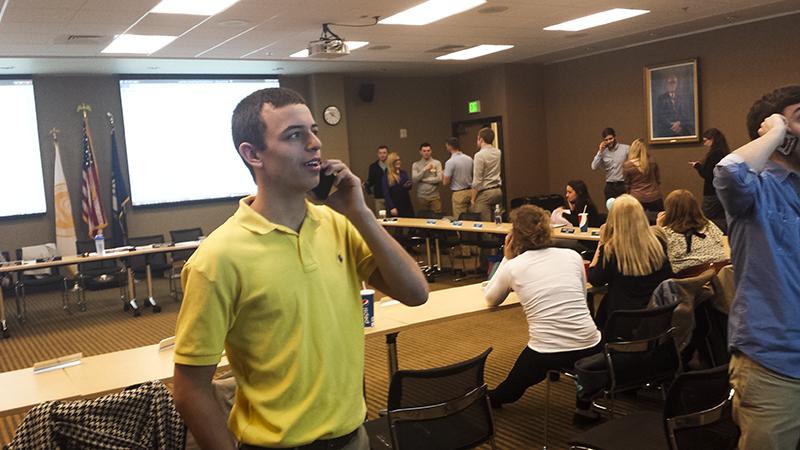Financial woes to take toll on NKU students’ tuition
SGA Senator Jarrod West calls Kentucky’s legislative hotline. The senators called the hotline during one of their meetings.
NKU is expected to see an approximate five percent increase in tuition if it receives no aid in its financial burdens.
According to NKU’s President Geoffrey Mearns, the university needs an approximate $6 million, part of which is coming from Governor Beshear’s 2.5 percent proposed operating budget cut of state support to all universities.
“To us, that translates out to approximately $1.2 million dollars,” Mearns said.
The remaining funds NKU needs comes from its Kentucky Employee’s Retirement System (KERS), a pension plan for NKU’s staff members.
“Different universities have different amounts of KERS contributions. UK and U of L don’t have any staff in the KERS system, so for them the cost increase doesn’t affect them. Our $4.5 to $5 million dollars is by far the largest of any of the others,” Mearns said.
Construction projects, like Norse Commons, Northern Terrace and the rec center won’t be affected by the 2.5 percent budget cut according to Mearns.
“Those projects will not be affected at all,” Mearns said. “Those projects are in our capital budget as opposed to our operating.”
Mearns said that all divisions university wide will be expected about five percent from their budgets.
“The vice presidents are in charge of various divisions. I’ve asked them to present to me a plan for their entire divisions to reduce by five percent,” Mearns said. “They have the ability to… differentiate that target within their divisions.”
Using academics as an example, Mearns explained that each vice president, in this case the provost, “could decided that one college could increase by more than five percent and one college could by less than five percent.”
He said that as long as it all added up to a five percent reduction, then it would work. In this way, the five percent cut won’t be across the board, there will be some differentiation.
Mearns said recruiting a large class of incoming freshmen would help with the budget reductions, and the target goal is to recruit an extra 150 to 200 students.
“We, in all likelihood, will build the budget off of a target of a flat enrollment rate. Therefore, if we can increase enrollment, it might allow us to then soften the budget reductions because there will be revenue,” Mearns said.
The need for more students will not affect the enrollment standards for NKU, he said.
“We could solve and increase enrollment by simply admitting students below our admission standards, but we’re not going to do that,” Mearns said. “We’re going to remain committed to our admission standards.”
Mearns said, in the worst case scenario, if NKU receives no aid and the five percent tuition increase does happen, the extra tuition money would go towards the approximate $5 million for KERS.
“Every dollar that we would raise as a result of that tuition increase from our students and their families would go to pay that pension cost. Not a single dollar of that tuition increase would go to that salary of a faculty member, the salary of an advisor,” Mearns said. “It wouldn’t even go to pay the electricity bill. It’s just not the way in which we would solve this problem.”
NKU’s Student Government Association has approved two resolutions to help the university with its funding problem. One will request state legislators not to take away the $97 million that’s been set aside for the Health Innovations Center and the other requests legislators for $16 million to aid the budget.
“We’re sending copies of the resolutions to the members of the Northern Kentucky Caucus,” Elizabeth Ruwe, junior public relations and Spanish major and one of the SGA senators who put the resolutions together said. “So they’ll be getting a copy of each in the mail.”
The resolutions were put in place in order to help keep tuition costs down for students.
“We don’t want to make college more difficult to afford for everyone who is already struggling for afford school to begin with,” SGA President Erik Pederson said. “I mean, that like backwards logic.”
Any one wanting to get involved can call the Kentucky Legislative hotline contact their state legislator and ask them to reconsider cutting funding to NKU.
Your donation will support the student journalists of Northern Kentucky University. Your contribution will allow us to purchase equipment and cover our annual website hosting costs.


